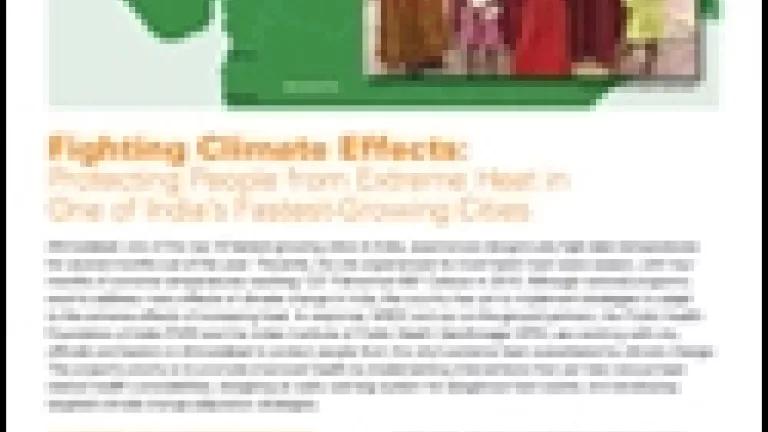
While the Coliseum in Rome is covered with snow, residents in Ahmedabad’s city center will be experiencing 90° Fahrenheit (32° Celsius) temperatures this weekend. I am currently in Ahmedabad, meeting with our partners from the Public Health Foundation of India (PHFI) to plan for the fast- approaching extreme heat season, when temperatures can spike to 122° Fahrenheit (50° Celsius). We are working with our on-the-ground partners, PHFI and the Indian Institute of Public Health Gandhinagar (IIPH), and local officials to protect local communities from the harmful health effects of extreme heat by implementing strategies to improve preparedness for the Ahmedabad’s increasing heat.
Our newly-released factsheet, Fighting Climate Effects: Protecting People from extreme Heat in One of India’s Fastest-Growing Cities, discusses our project’s goal to promote improved health by implementing interventions to help reduce heat-related health vulnerabilities, designing an early warning system for dangerous heat events, and developing targeted climate change adaptation strategies. The factsheet highlights the recommendations developed to address extreme heat vulnerability, progress that has been made to date and ongoing work to develop an early warning system and a climate change preparedness plan for Ahmedabad.
Addressing Heat Vulnerability in Ahmedabad
The factsheet provides recommendations developed by expert scientists, government administrators and health officials at a 2011 kick-off workshop held by PHFI, IIPH, and NRDC to address heat-health vulnerability, including:
- Researching impacts of heat stress, community resources, and existing heat-coping measures through in-depth discussions with four groups: vulnerable people living in slums, workers in high-risk occupations, city department staff, and health care providers; and then analyzing data on local temperatures and corresponding deaths.
- Identifying the most vulnerable populations in Ahmedabad through surveys assessing current heat awareness and susceptibility, and distributing an informational pamphlet on reducing extreme heat’s health risks to families with young children and the elderly.
- Developing an actionable early warning system in Ahmedabad and integrating it into a local climate change preparedness plan to warn the population of impending extreme heat events.
- Targeting heat-risk-reduction outreach to the most heat vulnerable groups, including young children, elders, people with heart or lung illnesses, families living in poverty, and workers in high-risk occupations.
- Conducting best-practices workshops with Ahmedabad city departments, medical providers, workers in high risk occupations, and community leaders to implement extreme heat strategies, build local capacity, and improve internal information sharing and communication.
Early Progress
Following those workshop discussions, NRDC and our partners collaborated with Emory University’s School of Public Health in the summer of 2011 to conduct Ahmedabad’s first heat vulnerability assessment survey. The in-depth survey assessed 12 slums on household member health history, heat-exposure adaptation, heat-stress knowledge, and access to resources.
As a result of PHFI, IIPH, and NRDC’s communication with the Ahmedabad Municipal Corporation (AMC), Ahmedabad officials are now developing a climate change state action plan, and specifically, accelerating efforts to protect communities from extreme heat. Also, local officials announced plans to install 10 weather gauges to examine historical weather trends, determine high-risk areas, and warn local communities about impending heat waves.
Looking Ahead
In 2012, we will continue to support the development of an early warning system and a climate change preparedness plan for Ahmedabad. NRDC, PHFI, IIPH and local partners will hold a heat sensitization workshop and focus group for medical providers in Ahmedabad in March 2012. The subsequent focus group will allow participants to share experiences to date and discuss concrete heat adaptation protocols to implement. This ongoing research and intensive outreach regarding the importance of heat adaptation has the potential to save lives from the increasingly severe effects of climate change.
Co-authored by Meredith Connolly, NRDC Energy Law & Policy Fellow